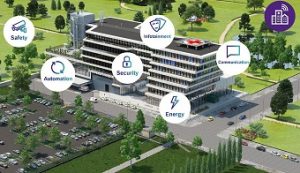
Preventing the theft of expensive medical equipment, stopping unauthorised persons from entering restricted areas, and informing the OR of a rescue helicopter’s arrival: with the help of intelligently connected cameras, video technology, and much more, things that used to be impossible at hospitals – or were only possible as stand-alone, non-digital solutions – are now child’s play thanks to Bosch’s internet of things (IoT) expertise.
According to the insurance industry, the theft of endoscopic devices results in millions of euros in damages for hospital operators throughout Europe. Sensor-based video technology in corridors and at points of entry and exit can provide crucial evidence for prosecuting criminals. Prevention is equally important. Intelligently controlled lighting, connected motion detectors on doors and windows, and intrusion alarm systems scare off burglars, prevent theft, and save operators the high cost of having to replace expensive medical equipment.
IoT connected solutions also provide greater convenience and efficiency in hospitals. Bosch plans to generate sales of around 100 million euros with smart hospital projects in the years ahead. For the entire Energy and Building Technology business sector, Bosch expects sales growth of around five percent this year, more than double the sector’s growth rate last year.
Hospitals are under tremendous pressure. They have to function smoothly 24 hours a day, 365 days a year. Under constantly rising cost pressure, doctors and nurses have to care for patients, people and valuable equipment also have to be protected, and technical infrastructure has to be managed optimally. With smart hospital solutions, Bosch relieves the burden on hospital operators and staff when it comes to technical and administrative duties. Patients also benefit from new, connected services in their hospital rooms, such as interactive infotainment systems.
At the Rechts der Isar hospital in Munich, one of Germany’s largest medical centres, a connected control centre ensures an optimal overview of the hospital’s safety-relevant processes. From there, employees can monitor gates, intercoms, and the installed video cameras. Four multi-picture-display monitors make it possible to keep an eye on 34 clinics and departments.
The system is also used to control safety-relevant access points. In addition, connected cameras and monitors register the landing of rescue helicopters, notify the OR directly of their arrival, and inform the relevant members of staff. To enable these new functions, Bosch has added internet capabilities to existing, non-digital surveillance cameras and networked them to create a single system, saving the cost of having to buy more than 70 cameras, cutting the facility’s operating costs, and reducing the burden on employees
Bosch also provides building automation, air conditioning, and fire detection equipment, as well as nurse-call and infotainment systems for patients – integrated, connected, and from a single source. The goal is to use connected solutions to create comfortable environments for providing medical care to patients that are also economical and reliable.
Since December 2016, Bosch has been an energy partner for a 750-bed cancer treatment centre in Bangalore, India, which handles around 390,000 patients a year. The facility is part of the Narayana Hrudayalaya (NH) chain. With 30 hospitals at 18 locations, NH is one of the largest healthcare providers in India.
At the heart of the project is a sensor- and software-based energy solution that will ensure a high degree of energy efficiency in the long term while guaranteeing outstanding convenience and comfort for patients and staff. Bosch is also supporting facility management in its day-to-day work with an innovative energy management and monitoring system, allowing the facility to cut costs by around twelve percent compared to its previous expenses. Staff members can use their smartphones, tablets, and desktop computers to access energy data at any time and react immediately to irregularities.
Together with other partners, Bosch is dedicated to developing additional IoT-based services for the hospital sector. In emergencies, smart indoor solutions can make it possible to locate urgently needed medical equipment, for example, and transport it to certain areas of a hospital. Indoor positioning works by equipping essential medical equipment or other objects with sensors. Using sensor technology, they transmit their position or condition (such as their battery status) in real time via an internal network or a cloud to doctors and nursing staff. Such solutions speed up processes at hospitals and can even save lives – because in an emergency, every second counts.











